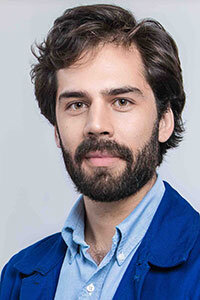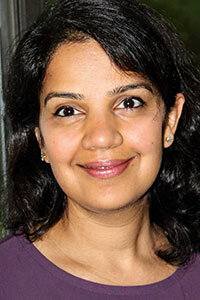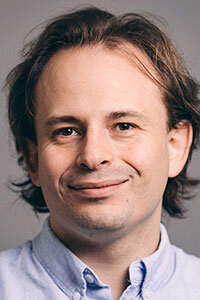The Department of Computer Science extends a warm welcome to 12 new faculty members, joining us throughout 2020 and 2021.
Mario Badr
Assistant Professor, Teaching Stream
Started July 1, 2020
Mario Badr joins the Department of Computer Science as Assistant Professor, Teaching Stream. Born in Lebanon, Badr first joined the University of Toronto as a computer engineering undergraduate in 2005. Since then, he has explored much of what the University has to offer including: a professional experience year at Environment Canada, graduate school, completing his PhD in computer architecture in 2019 with Dr. Enright Jerger, and a postdoctoral fellowship centred around teaching. Outside of work, Badr is known for making gourmet mac and cheese, pretending to understand the subtle undertones of wines, and raving about his favourite (still unfinished) trilogy (The Kingkiller Chronicle).
Igor Gilitschenski
Assistant Professor
Starts July 1, 2021
Igor Gilitschenski will join the Department of Mathematical and Computational Sciences (University of Toronto Mississauga) in July 2021, in the Robotics Research Group. He is currently a research scientist at MIT, where he works within the Computer Science and Artificial Intelligence Lab (CSAIL), the Distributed Robotics Lab (DRL), and the Toyota-CSAIL Joint Research Center. He is the technical lead of DRL's autonomous driving research team and serves as an advisor to MIT’s driverless racing team. Gilitschenski’s overarching research interest is learning and inference for multi-modal perception and environment-aware decision making to enable robust interactive autonomy. Prior to joining MIT, he was working on visual navigation at the Autonomous Systems Lab of ETH Zurich and obtained a PhD in computer science at the Karlsruhe Institute of Technology. He is the recipient of best paper awards from the American Control Conference, the International Conference on Information Fusion, and the Robotics and Automation Letters.
Swastik Kopparty
Associate Professor
Starts July 1, 2021
Swastik Kopparty will join the Department of Mathematics and the Department of Computer Science in fall 2021. He is currently an associate professor of computer science and mathematics at Rutgers University in New Jersey. His research is in theoretical computer science and discrete mathematics, especially error-correcting codes, computational complexity theory, finite fields, randomness, and pseudorandomness. Kopparty received his PhD in Computer Science from MIT in 2010, and was a postdoc at the Institute for Advanced Study during 2010–2011. He is a recipient of the Alfred P. Sloan Research Fellowship and the NSF CAREER Award.
Rahul G. Krishnan
Assistant Professor
Starts July 1, 2021
Rahul G. Krishnan will join U of T’s Department of Computer Science and Department of Laboratory Medicine and Pathobiology, as well as the Vector Institute, in July 2021. Krishnan recently completed his PhD at MIT under Professor David Sontag. Before joining U of T, he will spend a year as a Senior Researcher at Microsoft Research, New England. Krishnan's research focuses on building novel machine learning algorithms to automate clinically meaningful problems, and to advance our understanding of human health. He is also interested in building algorithms for inference and learning in deep generative models of time-series data. Prior to his PhD at MIT, Krishnan received a BASc in computer engineering from the University of Toronto, and an MS in computer science from New York University.
Chris Maddison
Assistant Professor
Started July 1, 2020
Chris Maddison joins the Department of Computer Science and the Department of Statistical Sciences as an assistant professor. He is a CIFAR AI Chair at the Vector Institute, a research scientist at DeepMind, a member of the ELLIS Society, and a faculty affiliate of the Schwartz Reisman Institute for Technology and Society. He works on the methodology of machine learning, with an emphasis on algorithms that work at scale in deep learning applications. His research interests lie in the study of Bayesian inference, optimization, and search. Previously, he was a member at the Institute for Advanced Study in Princeton, NJ from 2019–2020, and he completed his PhD at the University of Oxford. Maddison was an Open Philanthropy AI Fellow during his graduate studies. He received a NeurIPS Best Paper Award in 2014. He was a founding member of the AlphaGo project, which received the IJCAI Marvin Minsky Medal for Outstanding Achievements in AI in 2018.
Alex Mariakakis
Assistant Professor
Started August 1, 2020
Alex Mariakakis joins the Department of Computer Science as an assistant professor. Mariakakis’ work broadly identifies applications of machine learning and computer vision on sensor data for human-centered issues. His primary research examines how smartphone sensors can be used to objectively measure symptoms that are typically judged qualitatively. His work is published in top-tier venues in his field, including CHI and IMWUT. Mariakakis recently completed a postdoc in the School of Computer Science and Engineering at the University of Washington and a part-time researcher position at Sage Bionetworks. Before that, he received his PhD in Computer Science and Engineering at the University of Washington under the advising of Shwetak Patel and Jacob O. Wobbrock. Alex is a recipient of the National Science Foundation Graduate Research Fellowship, the Qualcomm Innovation Fellowship, and the Gaetano Borriello Outstanding Student Award at UbiComp 2018.
Shubhangi Saraf
Associate Professor
Starts July 1, 2021
Shubhangi Saraf will join the Department of Mathematics and the Department of Computer Science in fall 2021. She is currently an associate professor in the computer science and mathematics departments at Rutgers University. Her research interests lie broadly in theoretical computer science with a focus in arithmetic complexity, error correcting codes, and sublinear time algorithms. She received her bachelor's degree in mathematics from MIT in 2007 and a PhD in computer science from MIT in 2011. Prior to joining the faculty of Rutgers University in 2012, she spent a year as a postdoctoral researcher at the Institute for Advanced Study (IAS). She is a recipient of the Alfred P. Sloan Research Fellowship and the NSF CAREER Award.
Robert Soden
Assistant Professor
Started July 1, 2020
Robert Soden joins the Department of Computer Science and the School of the Environment as an assistant professor. Soden’s research areas include crisis informatics, human-centred computing (HCC), and science and technology studies (STS). His research uses critical and participatory design tactics to evaluate and improve the technologies we use to understand and respond to environmental challenges like disasters and climate change. Soden holds a PhD in Computer Science from the University of Colorado Boulder, a master's degree in Natural Resources and Sustainable Development from American University and bachelor’s degrees in History and Political Science from the University of Illinois, Chicago. Prior to starting his PhD, Soden was a professional software developer and consultant to the World Bank’s Global Facility for Disaster Reduction and Recovery (GFDRR), where he launched the Open Data for Resilience Initiative, a worldwide effort to harness open data, open-source software, and civic technology to improve disaster and climate risk management.
Lisa Strug
Professor
Started September 1, 2020
Lisa Strug joins as a professor in the Department of Statistical Sciences and the Department of Computer Science. Strug’s research focuses on the development of novel statistical approaches to identify genetic contributors to human disease. Strug is a senior scientist at the Hospital for Sick Children, associate director of The Centre for Applied Genomics, and has a status appointment in the Division of Biostatistics at U of T’s Dalla Lana School of Public Health. She is the lead of the Canadian Cystic Fibrosis (CF) Gene Modifier Study, co-lead of the International CF Gene Modifier Consortium and director of the Ontario Regional Centre of the Canadian Statistical Sciences Institute (CANSSI). She has received several honours including a Tier 1 Canada Research Chair in Genome Data Sciences. Strug completed her graduate work in biostatistics at Johns Hopkins University and the University of Toronto, and completed a post-doctoral fellowship and faculty appointment in statistical genetics at Columbia University.
Nandita Vijaykumar
Assistant Professor
Started July 1, 2020
Nandita Vijaykumar joins the Department of Computer and Mathematical Sciences (University of Toronto Scarborough) as an assistant professor. Vijaykumar’s research interests lie in the general area of computer architecture, compilers, and systems with a focus on the interaction between programming models, systems, and architectures. Her recent interests are also in the system-level and programming challenges of large-scale machine learning and robotics. She received her PhD in electrical and computer engineering from Carnegie Mellon University in 2019. Her PhD dissertation research focused on enabling practical cross-layer approaches to system design to rethink the abstractions and interfaces with which the programming model, system, and the hardware architecture interact.
Bo Wang
Assistant Professor
Started September 1, 2020
Bo Wang joins the Department of Laboratory Medicine and Pathobiology and the Department of Computer Science as an assistant professor. Wang’s research areas include machine learning and computational biology. He is the lead scientist of the artificial intelligence team for Peter Munk Cardiac Centre at University Health Network. He also holds a CIFAR AI Chair at Vector Institute. Wang obtained his PhD from the Department of Computer Science at Stanford University, and has extensive industrial research experience at many leading companies such as Illumina. His long-term research goals aim to develop integrative and interpretable machine learning algorithms that can help clinicians with predictive models and decision support to tailor patients’ care to their unique clinical and genomic traits.
Nathan Wiebe
Assistant Professor
Starts January 1, 2021
Nathan Wiebe will join the Department of Computer Science as Assistant Professor in January 2021. Wiebe’s research focuses on quantum algorithm development, in particular, on quantum methods for machine learning and simulation of physical systems. He received his PhD in 2011 from the University of Calgary studying quantum computing before accepting a post-doctoral fellowship at the University of Waterloo and then joining Microsoft Research in 2013. In 2019 he joined the faculty of the University of Washington as an affiliate assistant professor in the physics department and Pacific Northwest National Labs as a senior scientist.













